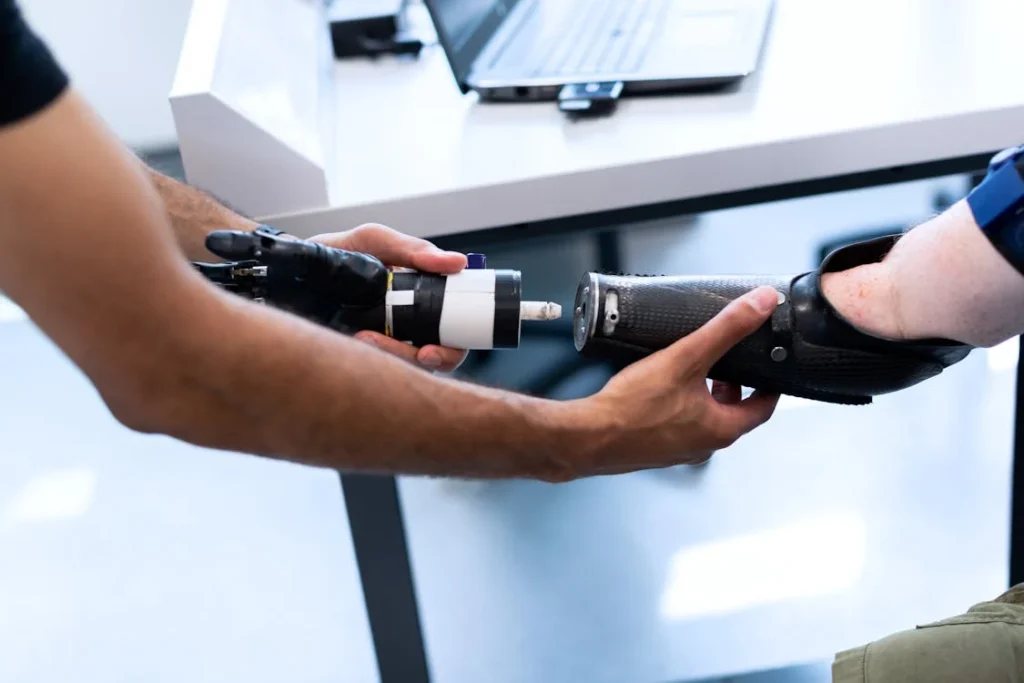A missing hand should never mean missing out on life. That’s our simple belief at Robobionics.
Every day, in a city like Chandigarh—where people live with big dreams and even bigger determination—we see individuals facing challenges most of us don’t think twice about. Tasks like tying a shoelace, holding a cup of tea, typing an email, or even giving a handshake become daily battles when someone has lost a limb. These are things that should be easy, but for many, they aren’t.
We exist to change that.
At Robobionics, we are not just prosthetic manufacturers. We are problem solvers, engineers, and passionate humans who want to see others rise. Over the years, we’ve worked closely with amputees and people born without limbs to give them something more than just a mechanical device. We give them back their independence. We help them feel whole again.
If you’re from Chandigarh or nearby, and you’re looking for the best prosthetic bionic hand—one that works naturally, feels intuitive, and fits seamlessly into your life—this article is for you.
But this isn’t just a generic blog post full of technical jargon or marketing fluff. This is a detailed, heart-to-heart guide written for you—whether you’re a patient, a caregiver, or someone exploring solutions after an accident or surgery. It’s about your future, your functionality, and your freedom.
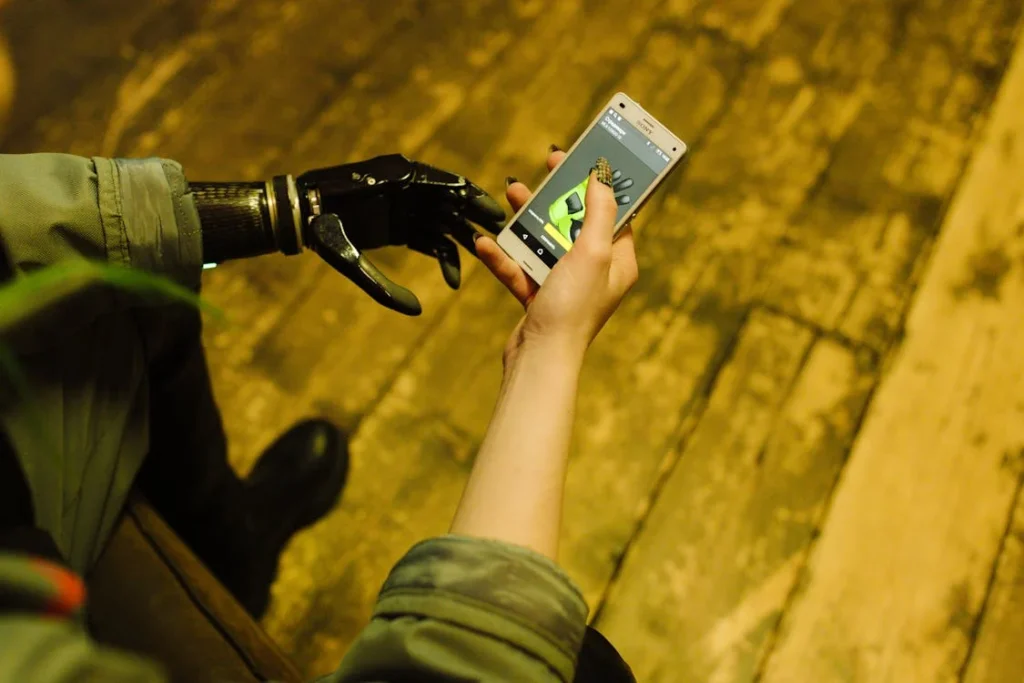
Understanding What Makes a Great Bionic Hand
How It Feels, Not Just How It Functions
When you’re looking for a bionic hand, it’s not just about wires, sensors, or motors. It’s about feeling normal again. It’s about doing the little things with ease—opening a water bottle, using a mobile phone, picking up a spoon, or brushing your hair.
It’s not about the hand being smart. It’s about the hand becoming you. That’s the real goal.
Now, here’s the thing most people don’t realize—many prosthetic hands are built more for looks than for function. They might look sleek and modern, but the real test happens when you try to live with them.
Can you cook while wearing it? Can you work on a laptop without removing it every ten minutes? Does it respond naturally to your intention to move? Can you wear it for hours without discomfort?
If the answer is no to any of these, then it’s not the right hand for you.
That’s why we, at Robobionics, never start with the technology. We start with the person. Your lifestyle, your goals, your comfort—that’s what guides our innovation.
Chandigarh has a vibrant mix of people—students, workers, athletes, artists. So why should everyone get the same bionic hand? We believe each person deserves a hand designed for their life, not just their limb difference.
What Your Body Wants, Your Hand Should Understand
A truly great bionic hand doesn’t feel like a gadget. It feels like a natural extension of your thoughts. When your brain sends a signal to close your fingers, the hand should follow without delay, without struggle.
This is made possible through something called myoelectric control. It picks up signals from your remaining muscles and translates them into hand movements.
But here’s where it gets tricky—many companies claim to offer “myoelectric control,” but their systems are either too sensitive or not sensitive enough. One moment it’s not moving at all. The next, it’s jerking uncontrollably. That’s not control. That’s frustration.
At Robobionics, we’ve refined this process using adaptive signal learning. Our system gets to know your muscle patterns over time. The more you use it, the smarter it becomes. Eventually, it becomes second nature. You think, and it responds.
People in Chandigarh who’ve used our hands often forget they’re even wearing them. That’s how natural it feels. They cook, drive, write, and even shake hands without hesitation. Because the hand doesn’t just obey. It understands.
Power, Without the Pressure
Another common problem people face with prosthetics is weight and balance. Some hands are heavy at the wrist. Some strain the shoulder. Over time, they can cause back pain, muscle fatigue, and poor posture. For someone recovering from trauma or surgery, that kind of stress is not just inconvenient—it’s dangerous.
We’ve spent years working with orthopaedic experts and physiotherapists to get the weight distribution just right. Our bionic hands are light where they need to be, strong where it counts, and shaped for real-life daily motion.
You’ll never have to take off your hand mid-way through a task because it got too heavy. You’ll forget you’re even carrying it.
And while we’re on the subject—charging the hand shouldn’t be a chore either. That’s why our batteries are designed for quick charging and long usage. You won’t be tethered to a wall socket all day. Just charge it once, and get on with your life.
Built for Indian Conditions, Powered by Indian Innovation
Let’s not beat around the bush—most imported prosthetics are designed for Western conditions. Cool climates, different skin types, and different body sizes. But life in India is different.
The heat, humidity, dust, and even the pace of life are unique. And when you’re in a city like Chandigarh—where the summers are hot and the pace is fast—you can’t afford a bionic hand that shuts down in the middle of your day.
That’s why every Robobionics hand is tested for Indian conditions. Our hands can handle the heat, resist sweat, and stay responsive even in challenging environments.
Whether you’re a student rushing to class, an office-goer catching a bus, or a shopkeeper working through a busy day—our prosthetics are built to match your rhythm.
We’ve also made sure our hands are compatible with Indian lifestyles. Need to eat with your hand? Done. Need to carry grocery bags, write in Hindi or English, use UPI apps, or help out on the farm? Done.
This isn’t just engineering. It’s empathy. And it’s why our users in Chandigarh keep coming back—not just for repairs or upgrades—but to say thank you.
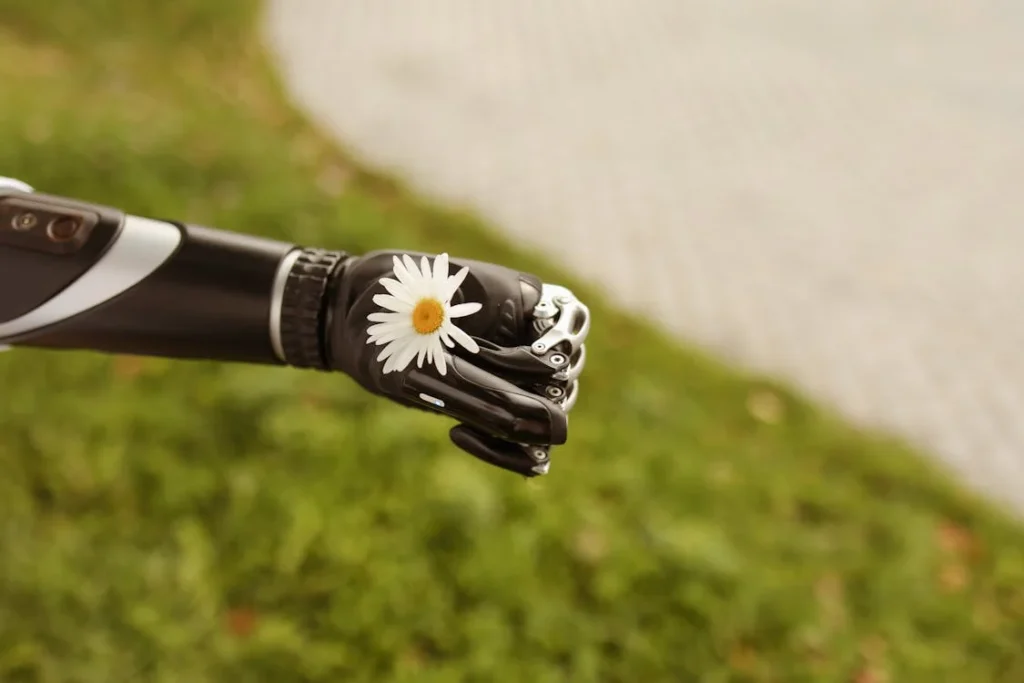
Why Robobionics is the #1 Choice in Chandigarh
Not Just a Product—A Personal Solution
When people in Chandigarh come to us looking for a bionic hand, they’re often tired. Not just physically, but mentally. They’ve tried other options.
Some have used passive prosthetics that look like a hand but don’t move. Others have imported expensive models that weren’t built for Indian life. Many were promised freedom, but ended up with frustration.
That’s where we’re different.
We sit down with every individual and learn their story. How did they lose their hand? What does their daily life look like? What do they want to do that they can’t do right now?
From school kids to senior citizens, we’ve met people from all walks of life in Chandigarh. And every time, our answer is the same: we will build a hand just for you.
This isn’t a sales pitch. It’s a commitment.
We offer free consultations—either online or in person—and we take our time. We explain how the technology works in very simple terms. No pressure, no hard sell.
Just an open conversation about what’s possible. Because once you understand your options, you’ll see why Robobionics stands out.
And once you try one of our bionic hands, there’s no going back.
Easy Fit, Smooth Start
The fitting process can be scary if you’ve never been through it. Some people think it will be painful or complicated. But with Robobionics, it’s anything but.
We begin by scanning your limb. Not with invasive procedures, but with a gentle 3D scanning process that takes only a few minutes. This helps us design a socket that fits perfectly. No slipping, no pressure points, no awkward gaps. Just a clean, secure fit.
Next comes calibration. This is where we teach the hand to understand your muscle signals. You’ll move your residual muscles slightly, and the sensors will pick up the patterns. Our system starts learning from day one. And you’ll be amazed at how quickly it responds.
Most of our users in Chandigarh report that they’re able to use their bionic hand within just a couple of sessions. From holding a glass to tying a shoelace, the progress is quick and natural. And we’re there every step of the way.
We offer in-person follow-ups, phone check-ins, and video sessions whenever you need us. You’re never left alone to figure things out. Because we know this isn’t just about technology—it’s about trust.
Affordable, Without Cutting Corners
Let’s talk about cost. It’s the elephant in the room for many families. Imported bionic hands can cost as much as a luxury car. And while they look great, they’re often overpriced and oversold. Most people in Chandigarh simply can’t afford them—and they shouldn’t have to.
At Robobionics, we believe everyone deserves access to advanced technology, not just the rich. That’s why we’ve worked hard to bring down costs without sacrificing quality. We design, build, and test everything right here in India. No middlemen. No inflated prices.
We’ve also partnered with hospitals, NGOs, and local support programs to make sure that those who need a bionic hand the most aren’t turned away because of money. We offer flexible payment plans and financial assistance wherever possible.
When you choose Robobionics, you’re not just getting a better hand. You’re getting a better deal—one that’s honest, fair, and built around your life.
People in Chandigarh Choose Robobionics for a Reason
You don’t need to take our word for it. Just look around Chandigarh. Our users include university students at Panjab University, engineers working in IT parks, shopkeepers in Sector 17, and even homemakers in nearby towns like Zirakpur and Mohali.
One of our proudest stories is about a young man named Arjun. He lost his hand in a factory accident on the outskirts of Chandigarh. At just 24, he thought his career was over.
He couldn’t ride his bike, couldn’t hold his tools, and started avoiding his friends. When he came to us, he was quiet and withdrawn.
Within a month of using our bionic hand, everything changed.
He started riding again. He went back to work. He even got engaged. Today, he volunteers with us part-time, helping others like him find hope again. Stories like Arjun’s are why we do what we do.
When people in Chandigarh choose Robobionics, they’re not just choosing a product. They’re choosing a path back to confidence, mobility, and independence. And that’s something no price tag can measure.
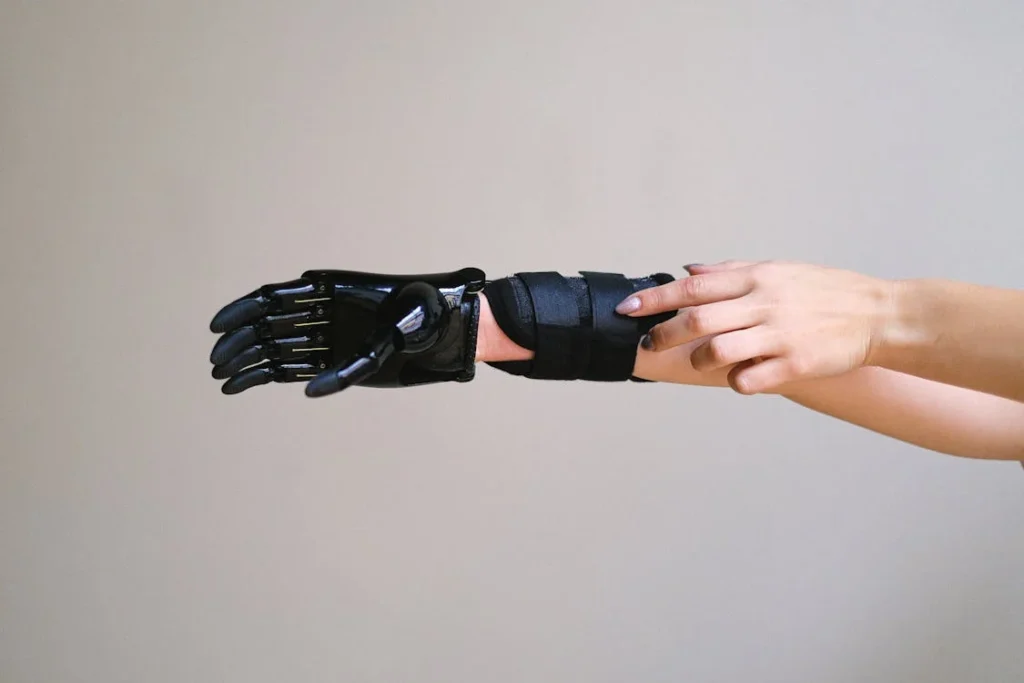
Technology That Adapts to You, Not the Other Way Around
Intelligence That Grows With You
The human body is full of subtle movements—tiny muscle contractions, shifts in weight, changing pressure. Most devices can’t keep up with that. They require you to move exactly the right way to make them work. That’s not natural. That’s not human.
At Robobionics, we’ve taken a completely different approach. Our bionic hands are designed to adapt to you—not the other way around.
From the moment you start using your hand, it begins learning. It notices how your muscles respond when you’re tired, when you’re active, or when you’re sitting quietly.
It adjusts to your strength level, your reaction time, and your style of motion. Over days and weeks, it becomes more accurate, more natural, and more in tune with your body.
This learning process is made possible by our custom-built adaptive algorithm, developed over years of research with real users across India.
It doesn’t just copy your signals. It predicts your intent. It sees your pattern of motion, learns how you move when you want to pick up a key or a coin, and adjusts grip accordingly.
For a user in Chandigarh, this means your hand will perform just as well when you’re in your office typing an email as it does when you’re sweating in 45-degree heat trying to open your scooter seat.
You don’t need to be a tech expert. You don’t need to “train” for hours every day. You just live your life—and the hand does the rest.
Motion That Matters
There’s a big difference between movement and motion that matters. You don’t need a hand that simply opens and closes. You need one that reacts when you want to hold your child’s hand, stir tea, grip a steering wheel, or turn a page.
Our hands come with multi-grip modes designed for real-life tasks, not just demonstrations. You can adjust between modes instantly with a simple motion or even a small gesture, and the hand will switch from pinch grip to power grip to precision grip—whatever your task needs.
But here’s the best part: you don’t need to memorize some complicated system of gestures. You tell us what you want your hand to do most often, and we’ll customize the grip modes and transitions just for that.
A tailor in Chandigarh needed fine pinch control for threading needles. A biker wanted quick grip strength to hold the clutch. A teenager wanted better rotation for gaming. We delivered—all using the same platform, adjusted to each person’s needs.
This is not just robotics. This is responsiveness.
Durability Without Compromise
India is not a lab. It’s real, raw, and sometimes messy. If your bionic hand can’t handle a bit of dust, sweat, or rain, then it’s not made for India.
That’s why Robobionics tests every unit for Indian realities. Heat waves in Chandigarh? No problem. Sudden downpours during monsoon? Protected. Long hours without charging points? We’ve got that covered too.
Our outer shell is strong yet smooth. It won’t break if you drop it. It won’t scratch easily if you’re active. And it’s gentle enough to hold something fragile. Inside, the components are sealed and secured.
The sensors are waterproofed. The motors are shielded against power surges. And the battery is tested to last through a full day of normal use—even in high temperatures.
For those who work outdoors, whether in the fields of Punjab or at construction sites in and around Chandigarh, this matters a lot. Your hand must perform—not just look good. That’s what we’ve built.
Even for office-goers, students, or homemakers, durability means peace of mind. You don’t have to treat the hand like a fragile gadget. You wear it, use it, live with it—just like you would with your natural hand.
Support That Stays With You
Getting a bionic hand isn’t a one-time thing. It’s a journey. Your limb may change shape. Your goals may evolve. You may have new tasks to perform. And that’s why support matters.
When you choose Robobionics, you’re not just getting a device. You’re getting a long-term partner.
We offer lifetime support with every hand. That includes check-ins, recalibration, software updates, socket adjustments, and training sessions.
You can reach us by phone, video, or in person. And if you’re in Chandigarh or nearby, we can even arrange home visits or workshops based on your needs.
Our team is made up of not just engineers and technicians—but real people who care. Many have family members who use prosthetics. Some have even gone through limb loss themselves. They understand the emotional and practical challenges you face.
When you’re struggling to get a grip just right, or your hand feels off balance, you don’t have to figure it out alone. We’re here. Every day. Every step.
In fact, one of our users in Chandigarh once called us at 10 p.m. because he had trouble reattaching his socket before a wedding the next morning. We helped him over a video call in 15 minutes—and he danced that night with confidence.
That’s what we do. That’s who we are.
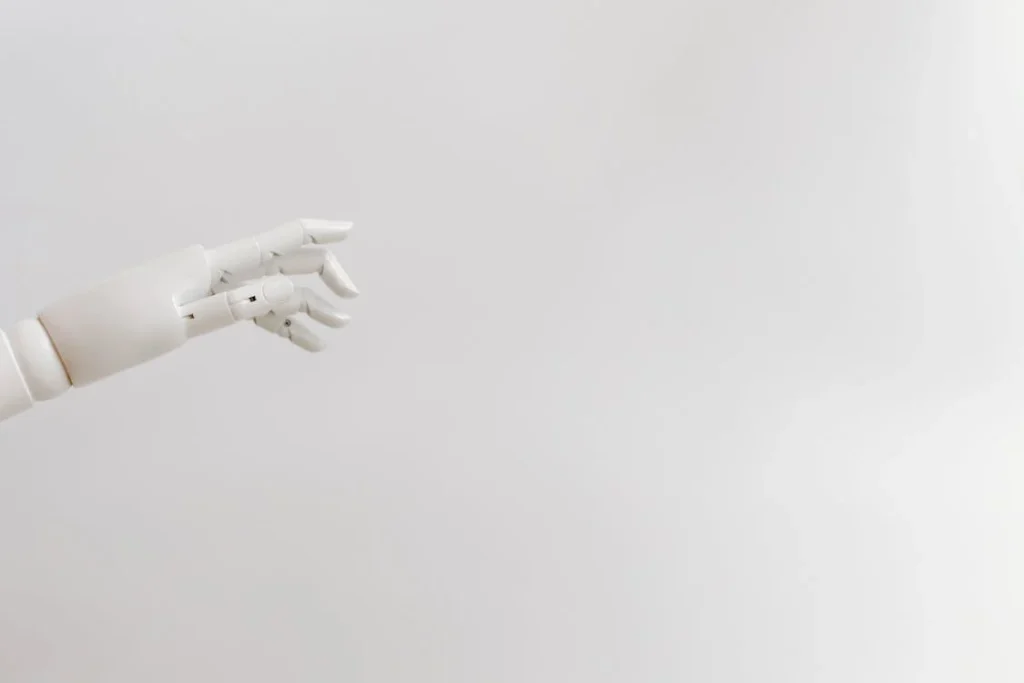
How Robobionics Makes Prosthetics Personal in Chandigarh
A City with Drive Deserves a Hand That Keeps Up
Chandigarh is not an ordinary city. It’s a place where tradition and ambition walk side by side. From early mornings at Sukhna Lake to the buzzing energy of the IT Park, the people here don’t slow down. And that means they need tools that don’t either.
We’ve always admired that about Chandigarh—the hustle, the sense of purpose. That’s why we made sure our bionic hands don’t just keep up with your lifestyle; they’re built to enhance it.
Whether it’s a college student riding a two-wheeler across town, or a small business owner managing inventory in a bustling market, there’s a constant need for reliability.
You can’t afford to lose time because your prosthetic is glitching or uncomfortable. And you definitely shouldn’t need to take it off every couple of hours just to give your arm a break.
With Robobionics, you don’t have to worry about that. We’ve studied the movements that people in Chandigarh make every single day. The turns of a bike handle. The swipe on a touchscreen. The delicate grip of a teacup. Our hands are designed with these tasks in mind.
So, when you put it on, it doesn’t feel like an accessory. It feels like it belongs. That’s the difference.
Training That Empowers You
Getting a new hand—even a smart, high-tech one—can be overwhelming at first. And we’ve seen this up close. The first time someone moves their fingers using only thought or muscle signals, it can feel magical. But it can also feel strange.
That’s why we don’t just hand over the device and send you on your way.
We offer personalized training sessions right here in Chandigarh. You can visit our partner centers or have one-on-one coaching online. We break it down simply. No scientific lectures, no robotic exercises. Just hands-on practice, guided by people who genuinely care.
We help you relearn basic tasks in a safe, supportive space. Drinking water. Writing your name. Pressing lift buttons. Slowly, we move to more advanced activities—cooking, driving, typing. Our training is practical, flexible, and always at your pace.
You’re never rushed. You’re never judged. You’re simply supported.
And when you start doing something you haven’t done in years—like tying your shoelaces without help—it’s not just about skill. It’s about confidence. That’s the real reward.
Custom Design, Because One Size Never Fits All
Let’s be honest. Everyone’s body is different. Your hand shape, your muscle strength, your skin tone, your limb structure—none of it should be standardized. Yet, many prosthetics are built in one mold and adjusted slightly after. That leads to poor fit, awkward posture, and discomfort.
At Robobionics, we take customisation very seriously.
We don’t just look at your measurements. We study your lifestyle. Are you more active in the day or at night? Do you sweat a lot? Do you prefer tighter fits or more relaxed movement? Are you working in an office, in a shop, or in the field?
All of this affects the way we build your hand.
Even the appearance is customisable. You can choose a natural skin tone that matches you perfectly—or go with a sleek, modern look if you prefer something stylish and bold.
Some of our younger users in Chandigarh have even asked for a “robotic aesthetic” that matches their gaming or tech interests. And we’ve delivered that too.
This level of personalisation isn’t just for looks. It’s a sign of respect. Because your hand should reflect you—your choices, your comfort, and your goals.
Why Families Trust Us
One of the most powerful moments we see is not just when a user tries our hand—but when their family sees it working.
We’ve had mothers cry when their child holds a spoon again. Fathers speechless when their daughter texts on a phone. Spouses who say, “I haven’t seen them this happy in years.”
Trust matters. Especially when someone you love is going through something this life-changing.
Families in Chandigarh often come to us with questions and worries. Will it hurt? Will it be hard to use? Will it change their personality or make them more dependent?
And every time, we show them—not with slideshows, but with real results. They see their loved one laughing again. They see independence returning. And they become part of the journey too.
We include family members in our training and consultations. We teach them how to support without smothering, how to encourage without pushing. Because the bionic hand is not just for the user. It’s for everyone who wants to see them thrive.
We’ve even had siblings and friends step in as emotional supporters during training. In one memorable case, a daughter from Panchkula brought her father in every day for two weeks, helping him relearn simple tasks.
She joked, cheered, and encouraged him through every step. By the end of the month, he was opening doors, slicing fruit, and even playing cards with his grandchildren.
That’s not just rehabilitation. That’s transformation.
Our Mission: Accessibility for All
Innovation means nothing if it’s not accessible.
That’s why we work hard to reach even those who are in smaller towns and villages around Chandigarh. We’ve partnered with local NGOs, rehabilitation centers, and even school programs to ensure that people aren’t left behind simply because they live outside the city center.
We offer mobile consultations, local camps, and transport assistance where needed. If someone can’t come to us, we do our best to go to them.
Because everyone deserves dignity. Everyone deserves the chance to live fully.
Robobionics isn’t just a company. It’s a community. It’s a mission. And Chandigarh is at the heart of it.
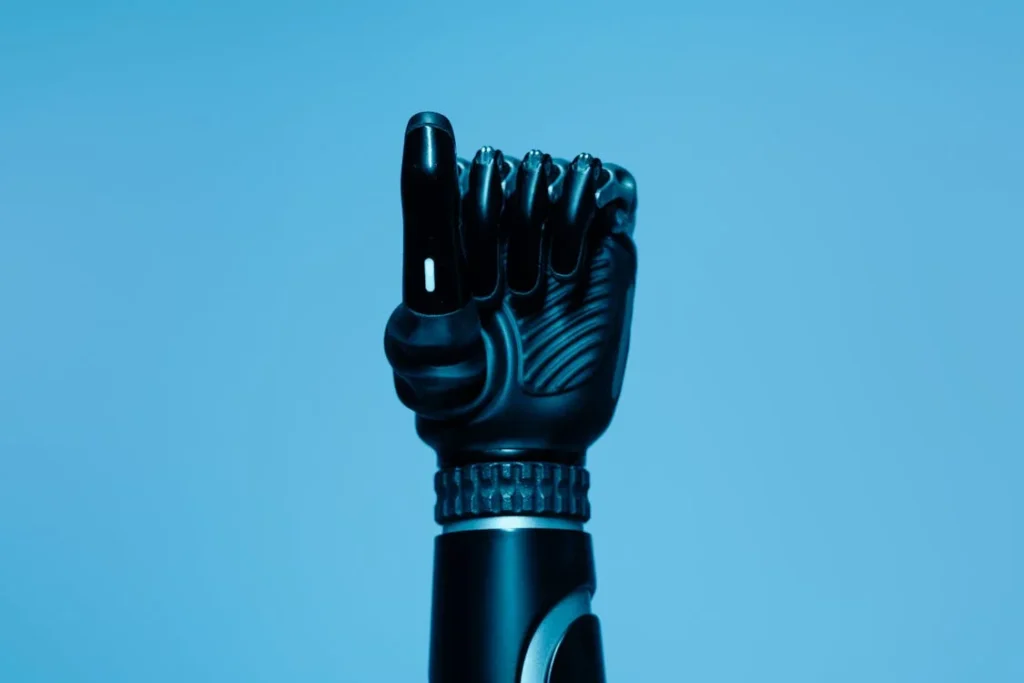
Beyond the Hand: The Inner Transformation That Robobionics Inspires
Regaining Identity After Loss
When someone loses a limb—whether through an accident, illness, or by birth—it isn’t just about the physical loss. It’s about what that hand meant. Your hand isn’t just a tool. It’s a part of your identity. It’s how you greet people. It’s how you hold loved ones. It’s how you express emotion. It’s how you connect.
In Indian society, especially in a culturally rich city like Chandigarh, appearance and ability carry enormous social weight. A person with a missing hand is often met with stares, awkward sympathy, or even distance.
Sometimes, people avoid eye contact. Sometimes, they assume you’re not capable—even if you’re still the same person on the inside.
That silent judgment can hurt more than words.
This is where the Robobionics journey becomes something more powerful than just a medical solution. When someone puts on one of our bionic hands and starts using it like it’s always been part of them, something inside changes too.
They stop feeling incomplete. They start feeling seen again.
We’ve watched people walk differently—head held higher, posture straight, smile a little more open—after just a few days of using their bionic hand. And it’s not because of the technology. It’s because they feel like themselves again. Whole. Present. Confident.
In Chandigarh, where people are deeply social and communities are closely knit, that emotional restoration changes not just the individual—but how their entire community relates to them.
Restoring Dignity in Everyday Life
There are tasks that most people never think twice about. Like reaching out to pay for groceries. Signing your name at a bank. Carrying a bag from the market. All of these small, everyday moments become loaded when you don’t have a hand.
Some people avoid these situations entirely. They ask someone else to sign documents for them. They make excuses to avoid going out. They feel embarrassed asking for help, and slowly, they pull back from the world.
We’ve had users in Chandigarh tell us, with complete honesty, that they stopped going to social gatherings. Family functions. Weddings. Even shopping trips.
But after using our bionic hand, that isolation starts to fade.
They start doing things themselves again—not because they have to, but because they can. That quiet dignity of independence doesn’t come with a price tag. It’s priceless. And it’s something that no therapy or medication can replace.
We’re not just restoring hand movement. We’re rebuilding confidence, privacy, and pride.
Changing How Others See You — and How You See Yourself
Here’s a beautiful thing that happens over and over again. When someone in Chandigarh starts using a Robobionics hand, people around them don’t just notice—they’re inspired.
We’ve seen school kids become more popular with their classmates because of their “cool robotic hand.” We’ve watched grandparents become heroes in their housing societies because they overcame something others feared.
We’ve seen managers take back leadership roles at work because they felt they could now “shake hands and look someone in the eye again.”
It might sound small. But these are the victories that matter most.
Even more powerfully, many users start advocating for others. They talk about their journey. They guide new users. Some of them join our workshops, not as clients—but as mentors.
The person who once felt invisible is now the one giving hope.
That shift—from shame to pride, from hesitation to leadership—is the most profound transformation we’ve seen. And it happens not through speeches or therapy. It happens through empowerment. Through using a tool that lets them reclaim their identity, on their terms.
A Culture of Resilience, Now Supercharged
Chandigarh has always been a city that values resilience. It’s built into the history, the architecture, and the people.
Whether it’s the spirit of partition survivors who rebuilt their lives here, or today’s young generation pushing boundaries in education, tech, and sport—this is a place that moves forward, no matter what.
Robobionics fits into that story perfectly.
We don’t just sell prosthetics. We amplify the natural resilience of people who’ve already overcome so much. We don’t make you something you’re not—we help you return to who you were, stronger than before.
And in a society that’s learning to be more inclusive, more aware, and more accepting, every bionic hand we fit becomes a small act of progress. A signal that disability is not the end of the story. It’s the beginning of a different kind of strength.
We’ve had users in Chandigarh who started businesses, applied to colleges, went back to sports, or even ran for local office—after getting their prosthetic hand. Because they no longer saw themselves as limited.
They saw themselves as ready.
And that’s what Robobionics gives. Not just movement. But momentum.

Building the Future of Prosthetics in India — And Why Chandigarh Is at the Heart of It
India Deserves Its Own Prosthetic Revolution
For decades, the world of prosthetics has been dominated by foreign products—imported hands made in labs thousands of miles away, priced beyond the reach of most Indians.
These devices, while impressive on the surface, were designed for different lives, different climates, and different cultures.
And while the need in India grew, the technology didn’t evolve with us. There was a gap. A disconnect. An entire population that was either underserved or overcharged.
At Robobionics, we decided to flip that narrative. We asked: why should India rely on someone else’s vision of what a prosthetic should be? Why can’t we build world-class bionic hands here, with our own minds, our own engineers, and our own understanding of what Indian users truly need?
And then we did just that.
From the earliest circuit designs to the final silicone skin tones, everything we create is designed, built, tested, and improved in India. This isn’t a cosmetic difference. It’s a complete shift in the way prosthetics are made—and who they’re made for.
Chandigarh plays a huge role in that vision.
Why Chandigarh Is More Than Just a Market—It’s a Launchpad
When most people think of tech innovation in India, they think of Bengaluru, Pune, or Hyderabad. But Chandigarh has quietly grown into a thriving innovation ecosystem, blending strong education, medical infrastructure, and a tech-savvy population.
It’s home to some of the brightest students from Panjab University, PEC, and nearby institutions. It has world-class hospitals, rehabilitation centers, and startups that are hungry to solve real problems.
It’s connected to Mohali, Zirakpur, Panchkula, and several towns that feed into a growing urban ecosystem.
All of this makes Chandigarh a perfect testbed for human-centric, high-impact technology like ours.
When we pilot a new feature, like improved finger articulation or real-time app-based control, we do it with real users in Chandigarh. Their feedback isn’t vague—it’s specific, practical, and brutally honest. And that’s what helps us improve.
In many ways, Chandigarh has become our proving ground. If it works for someone navigating Sector 22 traffic, managing housework in Manimajra, or walking long college corridors in scorching May heat—it will work anywhere.
And that’s not a marketing line. It’s our design philosophy.
Creating Jobs, Not Just Devices
Robobionics is not only reshaping prosthetic technology—it’s also reshaping how employment and manufacturing can grow locally.
By developing our tech in-house, we’ve created skilled jobs for Indian designers, mechanical engineers, software developers, 3D printing specialists, and rehabilitation experts. Many of them are from Tier-2 cities and smaller towns. Some are based in and around Chandigarh itself.
We’ve also built partnerships with local fabricators and suppliers—because we believe that innovation should not sit in isolated labs. It should live in ecosystems that feed into local economies.
Each hand we create touches dozens of Indian hands along the way—from the people who design the control boards, to those who shape the sockets, to those who train new users in clinics across Chandigarh.
So when you choose Robobionics, you’re not just investing in your own future. You’re helping grow a homegrown movement that empowers hundreds of others.
Technology with a Cultural Pulse
One of the most overlooked parts of prosthetic design is culture. Most Western-made bionic hands are built with assumptions: that the user will wear gloves, that light skin tones are the default, that tasks involve keyboards and cutlery.
But life in India—especially in cities like Chandigarh—is rich with ritual, color, and physicality. Lighting a diya during Diwali. Performing a namaste.
Holding a pooja thali. Kneading dough. Pulling open a jammed autorickshaw door. These are movements that don’t show up in foreign design manuals.
That’s why our hands are not just mechanical marvels. They’re built to respect and reflect Indian lives.
Want to perform aarti safely? We’ve got a grip mode for that. Need a flexible wrist rotation to clean your whiteboard at work? Done. Want your hand to match your exact wheatish or dusky skin tone so it doesn’t draw unnecessary attention at a wedding? We offer that too.
This may seem small, but it’s not. These cultural design cues are what make Robobionics not just Indian in name, but Indian in soul.
And Chandigarh has helped us realize how deeply meaningful that is. People here care about elegance, appearance, and social comfort. They want their technology to blend, not shout. And that’s shaped how we design for the entire country.
A Movement That Belongs to Everyone
We’re not a brand that believes in hiding behind closed doors. Our technology is not a secret to be sold. It’s a tool to be shared, taught, and scaled.
We routinely visit schools and rehab centers in Chandigarh to educate the next generation about bionics. We hold demo days, run workshops, and let children try out our prototypes.
Because one curious kid today might become the engineer who builds something even better tomorrow.
We also believe in open feedback loops. Our users are not test subjects—they’re co-creators. If something isn’t working for them, we change it. If something feels awkward, we redesign it. That humility, that openness—that’s what Chandigarh has taught us.
In many ways, this city has become our mirror. Sharp, resilient, forward-thinking, and rooted in identity.
And as we expand across India and beyond, that identity—shaped in Chandigarh—will continue to guide us.
Conclusion
In a city like Chandigarh—vibrant, ambitious, and full of life—your journey after limb loss doesn’t end. It evolves. At Robobionics, we’re not just giving you a prosthetic bionic hand. We’re giving you back your confidence, freedom, and the ability to live on your terms. We design every hand with your needs at the center. Built in India, for India. Tested by real people in real conditions. Backed by world-class support and powered by empathy, not just engineering.
Whether you’re walking into your first job interview, cycling through the streets of Sector 15, or just lifting a cup of chai again—Robobionics is with you.
Because this isn’t just about technology.
It’s about believing you can live fully again.
And with Robobionics, you can.
Your best life is waiting—reach out and grab it.
Starting today, starting with your hand.



